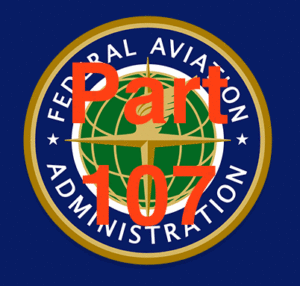 The Small UAV Coalition – an drone industry group promoting safety and innovation – has published a letter addressed to FAA Administrator Michael Huerta asking for clarification and some changes to the Part 107 Certificate test for commercial drone operators.
The Small UAV Coalition – an drone industry group promoting safety and innovation – has published a letter addressed to FAA Administrator Michael Huerta asking for clarification and some changes to the Part 107 Certificate test for commercial drone operators.The Part 107 test is an “aeronautical knowledge test” administered by the FAA, necessary to receive a “remote pilot airman certificate with a small UAS rating” as required by law to operate a drone for commercial purposes under the new rule, which will become active on August 29. (If you already have a Section 333 Exemption or a Part 61 certificate – a manned aircraft pilot’s license – the test may not apply.)
While the Part 107 test represents a major step forward for the drone industry, as it no longer requires that all drone businesses have a pilot, some industry stakeholders are concerned that poor communication and a rocky rollout could prevent operators from taking the test, and slow down the pace of industry growth.
The Small UAV Coalition has presented a letter to Administrator Huerta, asking that the process described in Part 107 be clarified and made easier to adopt. The Coalition asks first that the FAA offer online training which will be “easily accessible, affordable, and engaging” to make sure that drone operators have the necessary tools to be successful on the test. Training has been requested by a variety of stakeholders, the Coalition points out, and is one of the easiest ways to increase safety in the NAS.
Additionally, the Coalition asks for online testing – something that the FAA currently does not offer. While the FAA says that their authorized testing centers are numerous and widely spread – the agency estimates that applicants will travel an average of 19 miles to their nearest center – the Small UAV Coalition says that there are no reasonable security issues with offering the test online.
Finally, the letter asks the FAA to ensure that the test doesn’t overreach, and includes only the skills really necessary to operate a drone. “It is critical to the public’s acceptance of the aeronautical knowledge test that it be focused on the knowledge, skills, and behaviors needed to operate a UAS,” says the letter. “…we are concerned that the aeronautical knowledge test may be unduly burdensome if it includes questions pertinent only to operations in controlled airspace appropriate for manned aircraft pilots.”
While some operators are already working “under the table” without a certificate, drone industry stakeholders foresee a flood of applicants to obtain the Part 107 certificate at the end of August – something that the Coalition and drone operators everywhere hope will go smoothly, pushing the industry one step closer to full integration of drones in the NAS.
Source link
 Unmanned Aerial Vehicle The latest drone news
Unmanned Aerial Vehicle The latest drone news



